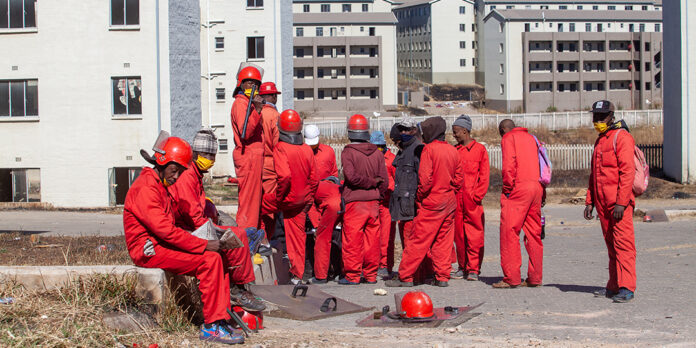Professor Mosibudi Mangena’s September 21, 2025 column in the Sunday World titled, “Declaring ‘South Africa belongs to all who live in it” is stupid and counterproductive” refers. The column raises important questions about nation building and post-apartheid belongingness that are worth debating. I will return to these issues in a moment.
Unfortunately, the good prof spoils the column with misleading statements about the South African Human Rights Commission (SAHRC). He claims that the SAHRC came down like “a ton of bricks” on Premier Panyaza Lesufi after the premier, in Mangena’s version “declared war on the proliferation of mekhukhu (shacks) in the province, many of which are inhabited by a significant number of undocumented migrants.”
Mangena writes “The SAHRC maintains that Lesufi would be violating the human rights of the illegal migrants and promised to stop him in his tracks, if he dared.”
These shocking and unnecessary mistruths cannot go unchallenged. The media statement issued by the SAHRC on September 7, 2025 referred to and condemned recent spates of unlawful evictions in the country. These unlawful evictions have violated the rights and dignity of impoverished and vulnerable persons. As a former minister, Mangena knows that the mandate of the commission is triggered whenever human rights are violated.
In line with our obligation, we reminded state organs that evictions can take place only if they do so within the confines of the law, namely the Constitution and the Prevention of Illegal Eviction from and Unlawful Occupation of Land Act.
As far as Lesufi is concerned, the SAHRC noted with concern the threat that the province will conduct evictions and displacements in the dead of night even “at 2am”. It warned that such conduct would be “inhumane, degrading, and dangerous. It is likely to expose families to criminality, trauma and displacement.
The SAHRC maintains that evictions must not only be carried out within the confines of the law and established jurisprudence including around meaningful engagement with affected communities and attempts at providing alternative accommodation.
As far as debates about the statements around belongingness made in the preamble, the commission takes this debate seriously. In March, it launched a six-year long campaign entitled Promoting a Culture of Human Rights and Social Harmony through the Resolution of the National Question (“National Question”) campaign.
The SAHRC developed this campaign as a tool to strengthen the discharge of its human rights promotion mandate.
The campaign aims to facilitate open and honest discussions on the state of and vision for the nation using a human rights lens and drawing from the past while crafting a human rights-based future where everyone experiences a sense of affective and material belongingness. The hypothesis of this campaign can thus be encapsulated in a tag line: ‘South Africa will not realise a culture of human rights without a collective sense of belonging.’
The three-day launch of this campaign included actors from government, non-governmental organisations and social movements, traditional leaders, academia, big business, youth, faith-based organisations, social media and traditional media practitioners, and artists. Panellists and speakers such as Prof Thuli Madonsela, Dr Mmatshilo Motsei, Dr Azar Jammine, Adv Gareth Prince, Prof Steven Friedman, Prof Rozena Maart, Duma Gqubule, Mark Heywood, Father Simangaliso Mkhatshwa, and Prof Piti-ka Ntuli debated various topics.
The commission does not shy away from discussion and critique of the Constitution. To be sure the first panel was titled, “The Constitution and the (im)possibility of Constituting a Truly Post-Apartheid Nation.”
This panel interrogated whether the Constitution has fulfilled its transformative promise, with calls for a renewed Truth and Reconciliation Commission and constitutional evolution to address unresolved colonial and apartheid legacies.
Others panel debated the lived experiences of historically marginalised persons and communities; the role of the creative arts, mainstream, and social media in social harmony and nation-building; and the unfinished business of reparations, redress, and reconciliation.
The campaign is not intended to be symbolic but a transformative process of justice, memory, and inclusion.
From our perspective, the failure to resolve the National Question – a question about how to forge a nation out of the ruins of settler colonisation and how that new nation launches itself into the community of nations as a sovereign and compassionate neighbour – is at the core of systemic and intractable human rights violations in SA today.
Scapegoating impoverished persons, undocumented persons, non-nationals and other vulnerable persons for the government’s failure to provide conditions for dignified living and full belongingness will not resolve this urgent question.
The government must be both social justice- and ubuntu-oriented. Is a 2amw6 eviction justified in a society based on the values of dignity, human rights and ubuntu-botho?
- Madlingozi is a SAHRC commissioner for anti-racism, education and equality




